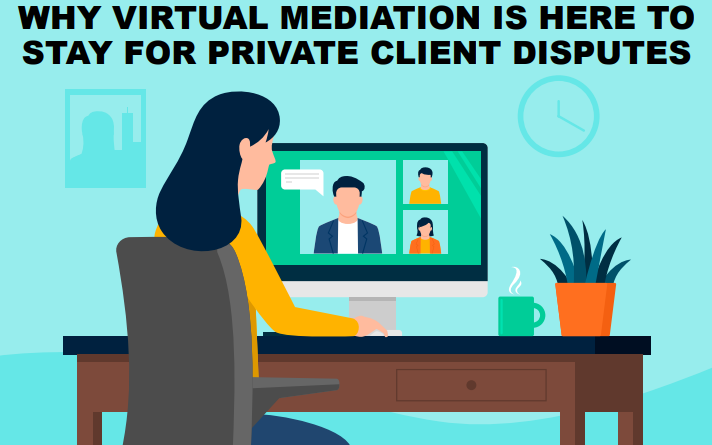Knowledge Hub
Join the Conversation!
Impartial and independent, ThoughtLeaders4 Disputes Knowledge Hub hosts cutting edge industry content and insight.
Email maddi@thoughtleaders4.com to submit content.
Why virtual mediation is here to stay for private client disputes
Date: 15/07/2020 Type: Articles Topic: Private Client | Trusts | Wills and Estates | Inheritance | Next Generation Wealth |A couple of months ago few people in the legal world had heard of virtual mediation. Thanks to Zoom’s confidential breakout room technology, virtual mediation has been widely adopted by mediators and litigators who have adapted quickly. Once the Rubicon is crossed, there is no going back.
In this article, I explore why virtual mediation will outlive the pandemic and share some tips from my experience of virtual mediation in private client disputes.
Advantages for private client disputes
- For many clients, a face to face mediation in an acrimonious family dispute is a very daunting prospect. Clients often fear bumping into their opponent arriving or leaving the venue or during the mediation. Virtual mediation strips away that anxiety.
- Joint sessions are likely to feel less intimidating as there is no need to be in the same room and look at each other across the table. There is something strangely calming about sitting in front of a computer screen expressing how you feel, compared with talking in front of a room full of lawyers and family members you have fallen out with.
- There is no “home advantage” associated with a virtual mediation. Arranging the logistics of a mediation can become very contentious. Some clients would rather pay to hire a neutral venue than walk onto the other side’s pitch. Virtual mediation enables a level playing field as everyone is in the comfort of their chosen environment, without the need for lengthy journeys for some and not others.
- There are considerable time and cost savings for clients. A one-day face to face mediation can become a three-day enterprise involving train fares, hotel bills and travel time. There are also more hidden costs in the form of the hourly rates of the lawyers debating where the mediation is to be held and liaising with venues. Virtual mediations are easier to schedule because of the time saving and individuals from different jurisdictions can join without international travel.
Positive dynamics of a virtual mediation
- For individuals, it is comforting to conduct a mediation from their own home. A client with a more relaxed mindset, is more likely to approach negotiations in a positive way. The ability to take more regular breaks by yourself and consume your chosen food and drink will reduce the common problem of blood sugar levels dropping to unhealthy levels resulting in rational thought being impaired.
- There is a power equalisation for the mediation participants. Some of the power passes from the mediation advocate to the client, who may feel empowered by not attending glamorous legal offices, which can add to nerves.
- As a mediator, it is easier to build rapport virtually than you might think. Video conferencing accentuates non-verbal language because there are fewer distractions, so it is very easy to read someone accurately over video.
- Many people fear that a virtual mediation would be less effective for highly emotional disputes. I find that people find it easy to be authentic and display emotion over video. There is in fact some safety associated with the distance created by the virtual environment. The experience is actually less intense for individuals.
- A creative mediator can enable a personal one to one conversation with a sense of privacy by asking others in the breakout room to mute their microphones and stop their video. It is also possible for the mediator to hide the image of themselves so that they are really focussing on the person they want to talk to.
Practical Tips
- It is essential to have a test call with all the mediation participants. This allows any technological issues to be ironed out. This also enables the mediator to deal with any administrative issues and start building rapport and trust with the client before the morning of the mediation. A pre-mediation call with the client, rather than just the legal representatives is something that I have always advocated as a mediator. Virtual mediation normalises this and people are beginning to see the benefits. Pre-mediation contact enables the parties to hit the ground running at the start of the mediation and get on with the negotiations.
- It is very important that everyone is positioned close enough to the camera, but not so close that it is impossible to see body language as well as facial expression. It is very difficult to build rapport with someone who is a long way from the camera or not sat squarely in front of it. Wobbling mobile phones are also unhelpful; joining from a computer screen is preferable.
- Legal representatives need to prepare well in advance for the settlement drafting stage of the mediation. Attending with pre-prepared settlement agreement templates is helpful. Using the “share screen” function in Zoom, or software that enables easy collaboration and comparison of amendments on a document is also beneficial.
- Agree who is attending the mediation from beginning to end. It is not helpful to have the sudden arrival of an overbearing spouse towards the end of a mediation if they change the dynamic of the negotiations having not heard everything that has led to that point. All mediation participants, not just the parties to the actual dispute, should sign the mediation agreement.
Some final thoughts
I heard a story about a virtual mediation which took place within 48 hours of lockdown starting. The client asked her solicitor afterwards why she was not given the option of virtual mediation before the Coronavirus. This story powerfully shows that solicitors are going to have to consider virtual mediation with their clients going forwards to comply with professional conduct rules.
I have always believed in good things coming out of bad situations. The Coronavirus crisis has given everyone an opportunity to reflect on the state of their family relationships, their health and wellbeing. Family feuds take a terrible toll on our mental health. People need to limit their stress by resolving conflict, buying certainty and a swiftly organised virtual mediation can offer that.
Author
Julia Burns – Dove in the Room
Our Disputes Corporate Partners




















